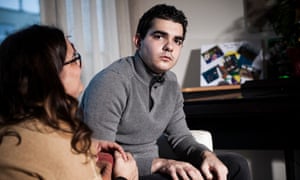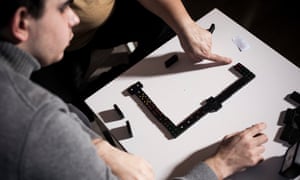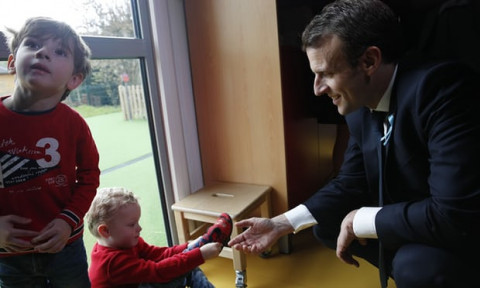
State’s treatment of autistic people had been denounced by UN and described as being ‘50 years behind’ rest of world
The French government has launched a €340m (£297m) strategy in an effort to make amends for the country’s scandalous state treatment of children and adults with autism, which has been denounced by the United Nations as a “widespread violation” of citizens’ rights.
President Emmanuel Macron, who made the need to improve the education and rights of people with autism a part of his election campaign, said he wanted everyone “to be included in school and everyday life”.
The strategy was launched by the prime minister, Édouard Philippe, on Friday afternoon and intends, in the words of one government adviser, to “at last” give children with a neurodevelopmental disorder access to mainstream education in France – a legal right that they have consistently been denied.
There will also be a drive to improve support for autistic adults, only 0.5% of whom are in regular employment, and who are routinely admitted to psychiatric hospitals. The government acknowledged that an adult with autism in France is three times more likely to be in long-term psychiatric care than the rest of the population. Rights groups decry the treatment as inadequate and inappropriate.
In its most recent report on the subject, the UN says children with autism in France “continue to be subjected to widespread violations of their rights”. The French state has had to pay hundreds of thousands of euros in damages to families for inadequate care of autistic children in recent years.
The UN found the majority of children with autism in France did not have access to mainstream education and many were “still offered inefficient psychoanalytical therapies, overmedication and placement in psychiatric hospitals and institutions”. Parents who oppose the institutionalisation of their children “are intimidated and threatened and, in some cases, lose custody of their children”, it added.
A 2005 law guarantees every child the right to education in a mainstream school, but the Council of Europe has condemned France for not respecting it. Pressure groups estimate that only 20% of autistic children are in school, compared with 70% in England. Those who are, are often only accepted part time.
Campaign groups and lawyers have described France as being “50 years behind” the rest of the world in its attitude towards autism, with an overreliance on outdated psychoanalytical approaches.
On Friday, Sophie Cluzel, the disabilities minister, said: “Inclusion is at the heart of this new strategy”, and that the government would seek to fully integrate citizens who for too long had been “relegated to institutions”. Cluzel said there had been “a cultural problem” in France, whereby citizens who displayed difference had been ghettoised and shut away, denied access to everyday life.
The government’s plan intends to increase diagnosis and early years support. It said that until now autism diagnosis was poor and too late – almost half of autistic children in France are diagnosed between six and 16.
There will also be an increase in scientific research into autism – an area in which France lags far behind other countries.
The government also said it would train doctors, teachers and early years staff – and overhaul the way school support staff were trained and recruited – in order to ensure that all autistic children were guaranteed a place in school.
Danièle Langloys, the head of the group Autisme France, said it was “strong” of the government to now insist on delivering the legal right of education for all, but she wondered how it would force schools to comply.
Hugo Horiot, a French writer, actor and director who is on the autism spectrum and whose latest book Autisme, J’accuse argues the need for French society to fully benefit from autistic people’s skills and intelligence, told the Guardian that in order to honour its promises, the government needed to redirect state funds currently being poured into the hospital and psychiatric system to deal with autism.
Horiot said: “In terms of inclusive schooling, this is good, but €340m is a drop in the ocean. The question is: will the government now go looking for the €7bn that state auditors revealed in January is spent each year on autism? Will the government transfer those state funds away from the medical and hospital lobby and instead put it towards schools?”
from https://www.theguardian.com/world/2018/…
'France is 50 years behind': the 'state scandal' of French autism treatment
A reliance on psychoanalysis sees autistic children going undiagnosed, being placed in psychiatric units and even being removed from their parents
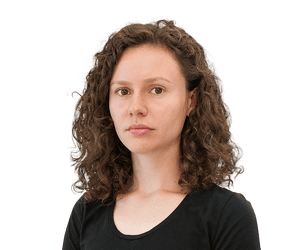
Angelique Chrisafis in Paris
Adrien Stranieri, 20, who has autism. His mother Catherine Chavy, left, had to fight to keep him out of institutions. Photograph: Ed Alcock for the Guardian
Like thousands of French children whose parents believe they have autism, Rachel’s six-year-old son had been placed by the state in a psychiatric hospital day unit. The team there, of the school of post-Freudian psychoanalysis, did not give a clear-cut diagnosis.
Rachel, who lived in a small village outside the alpine city of Grenoble, said she would go elsewhere to assess all three of her children. But the hospital called social services, who threatened to take the children away from her.
A consultant psychiatrist said Rachel was fabricating her children’s symptoms for attention, that they were not autistic, and that she wanted them to have autism spectrum disorder in order to make herself look more interesting.
Rachel’s children were taken and placed in care homes.
The children were subsequently diagnosed with autism and other issues, proving Rachel right. But despite a high-profile court battle in which parents’ groups denounced the “prehistoric vision of autism in France”, Rachel, who herself has Asperger syndrome, has still not won back custody of her children two years later. They remain in care with limited visiting rights. Local authorities insist the decision was correct.
If I hadn’t have done this on my own, I think he would be in an adult psychiatric hospital, tied up, on medication
Catherine Chavy
“I’m condemned to stand by powerless at the loss of my family,” she wrote after their latest visit to her at Christmas, fearing her children had regressed in care. “I’m destroyed, my children are destroyed.”
The “Rachel affair”, entering another courtroom appeal battle this summer, has become a symbol of what parents’ groups call the “state scandal” of the treatment of autistic children in France. The crisis is so acute that the centrist French president Emmanuel Macron has deemed it an urgent “civilisational challenge”, promising a new autism action plan to be announced within weeks.
The United Nations stated in its most recent report that autistic children in France “continue to be subjected to widespread violations of their rights”. The French state has been forced to pay hundreds of thousands of euros in damages to families for inadequate care of autistic children in recent years.
The UN found that the majority of children with autism do not have access to mainstream education and many “are still offered inefficient psychoanalytical therapies, overmedication and placement in psychiatric hospitals and institutions”. Parents who oppose the institutionalisation of their children “are intimidated and threatened and, in some cases, lose custody of their children”.
Autism associations in France complain that autistic adults are shut away in hospitals, children face a lack of diagnosis and there is a persistence with a post-Freudian psychoanalytic approach that focuses not on education but on the autistic child’s unconscious feelings towards the mother.
A 2005 law guarantees every child the right to education in a mainstream school, but the Council of Europe has condemned France for not respecting it. Pressure groups estimate that only 20% of autistic children are in school, compared with 70% in England.
“France is 50 years behind on autism,” said Sophie Janois, Rachel’s lawyer. Her book, The Autists’ Cause, published this month, sets out to raise the alarm on the abuses of autistic people’s legal rights. “Parents are told: ‘Forget your child, grieve for your child and accept the fact that they will be put in an institution’.”
“Underlying this is a cultural problem in France,” Janois says. “France is the last bastion of psychoanalysis. In neighbouring countries, methods in education and behavioural therapies are the norm and psychoanalysis was abandoned a long time ago. In France, psychoanalysis continues to be applied to autistic children and taught in universities.”
She said parents were forced to fight a constant administrative battle for their children’s rights. “There are suicides of parents of autistic children … at least five in the last couple of years.”.
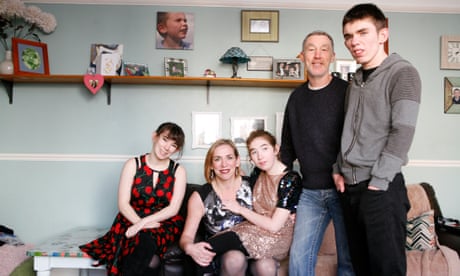
The row over post-Freudian psychoanalysis and autism in France has been bitter. Eighteen months ago, a group of deputies tried and failed to make parliament ban the use of psychoanalysis in the treatment of autistic children, claiming that the “outdated” view of autism as a child’s unconscious rejection of a cold, so-called “refrigerator” mother was denying children educational support.
Psychoanalysts, who have a powerful, leading role in French mental health care, criticised the campaign as “harmful” and defamatory.
In 2012, the French health authority stated that psychoanalysis was not recommended as an exclusive treatment method for autistic people because of a lack of consensus on its effectiveness. But most state hospitals still use the methods.
In addition, the United Nations warned in 2016 that a technique called “packing” – in which an autistic child is wrapped in cold, wet sheets – amounted to “ill-treatment” but had not been legally banned and was reportedly “still practised” on some children with autism. The then health minister issued a memo advising that the practice should stop.
Parents insist that excellent professionals are present in France, but they are few and in high demand, with services patchy and varying by area.
Adrien Stranieri plays dominoes with his mother, Catherine Chavy, who privately organised support for him at home. Photograph: Ed Alcock for the Guardian
“I was told by local authorities: ‘Why are you insisting on school? Put him in an institution,’” said one mother near Tours of her high-functioning autistic seven-year-old who is now doing well academically. “In France, there is an autism of the poor, and the autism of the rich. If I didn’t have money and the skill to fight, my son would have ended up in psychiatric hospital.”
Catherine Chavy’s son Adrien is 20 years old. As a small child he was treated part-time at a state psychiatric hospital that used a psychoanalytical approach. His autism went undiagnosed for years. Chavy fought for a diagnosis and entry to primary school, later finding a centre that used educational and behavioural methods, where Adrien flourished. When he reached 15, there were no provisions at all. She privately organised permanent support for him at home. “He cooks, does sport, goes to his grandma’s for lunch. He has a lovely life, going out every day. If I hadn’t have done this on my own, I think he would be in an adult psychiatric hospital, tied up, on medication,” she said. “The situation in France is a health and education scandal.”
Pascale Millo set up an association for parents of autistic children in Corsica. She has a 14-year-old son, also called Adrien, with high-functioning autism and dyspraxia. The state put him in a psychiatric hospital day unit for years, but Millo didn’t get a diagnosis until he was nine. Adrien is academically strong but she has had to fight for his right, as someone with dyspraxia, to do all schoolwork on a computer, taking on the training and support herself, never sure whether, from one month to the next, lack of support in the education system will mean his studies are cut short. “In theory, France has everything: state finances, and laws to protect us,” she said. “But those laws are not being respected.”
Vincent Dennery, who heads a collective of autism associations, said he hoped for concrete, practical measures in Macron’s autism action plan, and a move from a medicalised approach towards education. “There are still thousands of autistic children in psychiatric hospital day units who have no reason to be there, but their parents can’t find any other solution,” he said.
Dennery said he felt society needed to shift. “Culturally, French society has been a place of exclusion. A large number of societies deinstitutionalised disability or difference and moved to include people in ordinary life, but France has not.”
